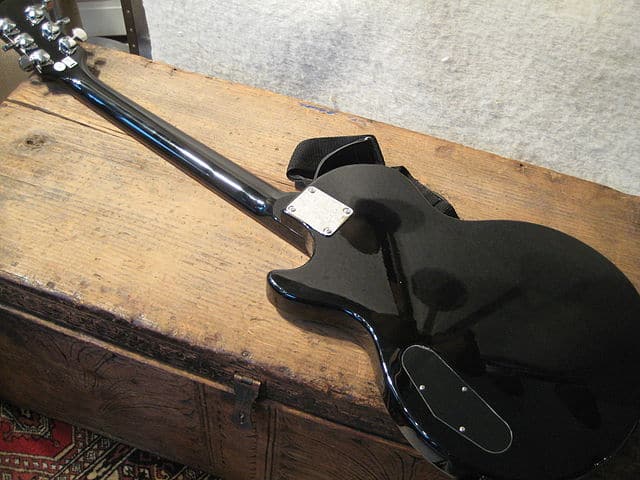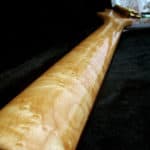Have you ever thought about how the neck of your guitar is the part of your instrument you make the most contact with?
Your fretting hand is constantly holding and traveling up and down along it.
For many players, this mundane experience is hindered by the finish of this piece.
A lot of them tend to gravitate towards satin finish necks claiming that they are faster and easier to play.
But are gloss guitar necks actually slower?
Here’s a short answer to that:
Gloss guitar necks are known to be rather sticky, especially when playing with sweaty hands. A lot of players prefer faster satin finishes on their instruments. You can always sand down your glossy guitar neck to make it faster, although this mod will likely affect the resale value of the guitar.
In this article, I will tell you all you need to know about the different performances of alternative neck finishes.
After leaving this page you will have a clearer idea about what might work better for you, and if there’s something you can do with your guitar to make it faster to play.
Are you ready to get started?
Let’s go!
What are gloss guitar necks?
Guitar necks need a coating layer to prevent oils and grime from your hands to build up and, in the long term, make them feel sticky and disgusting.
There are many different ways to finish a guitar neck, but, in particular, today we are talking about those finished with products like polyurethane-based lacquers.
These tend to end up with a rather glossy look, that looks great, but many people claim to have issues when playing them.
Why are gloss guitar necks so hated around players?
Glossy necks have the tendency of getting sticky, especially when your hands get sweaty after playing for a while.
This makes it harder to slide up and down them while playing.
For many players, that’s not an issue, but for many others is something unbearable.
What makes gloss guitar necks feel slower?
When playing quick lines that span several scale positions it’s very important to be able to move your hand across the neck smoothly.
The added friction of the sticky nature of glossy neck finishes makes it harder to move seamlessly through them.
Again, this is a nonissue for many “slow hand” players, but something infuriating for lots of shredders.
What is a faster alternative to gloss necks?
Most glossy neck haters agree that satin finishes are way faster and provide a smoother playing experience.
These alternative finishes are often factory specifications, or in some cases, particularly in heavily played instruments, are the result of worn-out originally glossy finishes.
In general, any finish that’s not as sticky, particularly when a little bit moist, will feel faster than glossy finishes.
Can you convert a gloss neck into a satin one?
Thankfully for many gloss haters, there are ways around them if you just can’t live with them.
The more radical alternative, in my opinion, could be a complete neck swap. If that’s possible (or reasonable) for your guitar, you should contemplate it as an alternative.
This is particularly easy for bolt-on necks, like the ones on Fenders.
Another option is just sanding the gloss out.
This is a mod that many players do on new guitars, and one that is done properly might really improve the feel of your neck.
Here’s a brief video explaining how it’s done:
Can you do this mod at home?
As you can see, sanding down a glossy neck is not particularly a very difficult job.
However, if you are not sure about it, or if you are not that very good with manual labor like this, maybe taking your guitar to a luthier or tech would be a good idea.
For an expert, something like this would surely be a rather easy job.
Is this mod worth it?
Absolutely, if you hate how your guitar’s neck feels, why keep it?
Unless we are talking of a vintage instrument or an expensive guitar, I think this mod is worth it.
Now, if the instrument in question is a rather expensive one, I would think about it twice.
Modifying the original specs will surely affect the resale value of any guitar, at least when the mod is based on the player’s subjective preference like this one.
Is this mod reversible?
Sanding down the finish of your neck is reversible. It will only take a refinish with a similar coat to the original.
However, this will surely affect the value of the instrument, as it is not original, and be somewhat costly.

Hello there, my name is Ramiro and I’ve been playing guitar for almost 20 years. I’m obsessed with everything gear-related and I thought it might be worth sharing it. From guitars, pedals, amps, and synths to studio gear and production tips, I hope you find what I post here useful, and I’ll try my best to keep it entertaining also.





